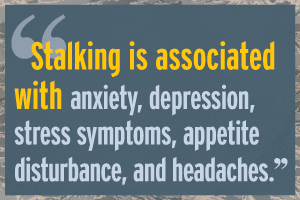By Elyse N. Mowle, Ph.D.
April 20, 2020
 PHCoE graphic
PHCoE graphic
In recent years the Department of Defense has made strides in sexual assault prevention and response, including an increased focus on addressing sexual assault of men in the military. Less attention has been given to the psychological health consequences of stalking. However, if an individual experiences inappropriate actions such as harassment, cyberstalking, and stalking, he or she may be at greater risk for assault. The 2014 Service Academy Gender Relations Survey DOD survey results provide empirical support for the notion that stalking, sexual harassment, gender discrimination, and sexual assault are all part of a "continuum of harm" impacting military culture. Stalking may include inappropriate advances, unwanted sexual comments, and even direct threats – behaviors which lie on the continuum of harm.
The Uniform Code of Military Justice (UCMJ) defines stalking as involving repeated proximity, or verbal or written threats, that place an individual in reasonable fear of death or harm. The Military Justice Act of 2016 designated stalking and cyberstalking as crimes under their own articles, and the changes went into effect in January 2019.
Fast facts about stalking in the military:
- The Department of Defense Fiscal Year 2018 Annual Report on Sexual Assault in the Military reported about 22 percent of women and 23 percent of men experienced stalking before and/or after a sexual assault incident.
- In a recent study, 38 percent of a sample of about 2,000 veterans indicated experiencing stalking during military service.
- Women reported most often experiencing unwanted messages, emails, or calls.
- Men reported most often experiencing someone showing up unannounced or uninvited.
- Stalking experiences were associated with symptoms of PTSD and depression, even after controlling for variables like deployment experience or sexual assault history.
Although less is known about the psychological health consequences of stalking in the military, in a study of civilians stalking was associated with anxiety, depression, stress symptoms, appetite disturbance, and headaches. While these experiences should be considered a normal response to a frightening situation, individuals who experience stalking may find some relief through psychoeducation, brief counseling or psychotherapy.
For patients accessing care, assessing service personnel for a history stalking experiences may help identify helpful areas for clinical attention. Providing treatment and connecting patients with support services can help and perhaps decrease the impact of such experiences on patients' mission readiness.
Health care providers can assist service members who have experienced stalking:
- Ask service members about stalking experiences in the course of an intake assessment, similar to how you would ask about relationship history or trauma experiences. Remember to help members understand the full range of behaviors associated with stalking, as the term "stalking" means different things to different people.
- The physical safety of the patient is paramount. A safety assessment should be completed once stalking behavior has been identified. Safety planning consists of appropriate responses, suggestions, and plans to consider in the event of a stalking incident. Consider whether the patient's situation requires contacting command and/or law enforcement. Confer with your facility's Medicolegal Advisor to determine if such action is warranted given your assessment.
- As an adjunct to the care you recommend, you might consider encouraging your patient to contact local law enforcement or to call the VictimConnect Resource Center at 855-484-2846 for additional support and resources for crime victims. The DOD Safe Helpline can also connect sexual assault survivors with resources in the local civilian community.
- Most cell phones have a safety feature which can be enabled to create an alert or dial emergency contacts. Encourage patients to familiarize themselves with the safety features of their phones.
- Encourage the patient to complete an incident log documenting the stalking incident, time, date, circumstances and whether the incident was reported to authorities. Appropriate authorities include but are not limited to local law enforcement and military police (if on a military installation). The incident log in combination with other messages or emails the patient collects and saves may be used as evidence of stalking which may support a military protective order or a civilian restraining order.
- When a form of maltreatment (e.g., sexual assault, intimate partner violence) is identified, ask about other forms such as stalking. Research suggests that some victims experience multiple forms of violence and cumulative traumas increase risk for psychological health concerns.
- If your patient is experiencing distress as a result of stalking, provide information about available counseling and support resources. If the distress requires psychological treatment, recommend interventions appropriate to the patient's presenting symptoms and consistent with VA/DOD clinical practice guidelines.
- Inform service personnel about available prevention and intervention services, such as the Family Advocacy Program for concerns with current or previous intimate partners, and Sexual Assault Prevention and Response victim support services and other support resources when a sexual assault has also occurred.
Dr. Mowle is a contracted sexual assault subject matter expert at the Psychological Health Center of Excellence. Her specialties include sexual assault prevention and treatment and the consequences of traumatic exposure.